Bachelor in Geography : General
-
Schedule
regular course
- ECTS Credits 180
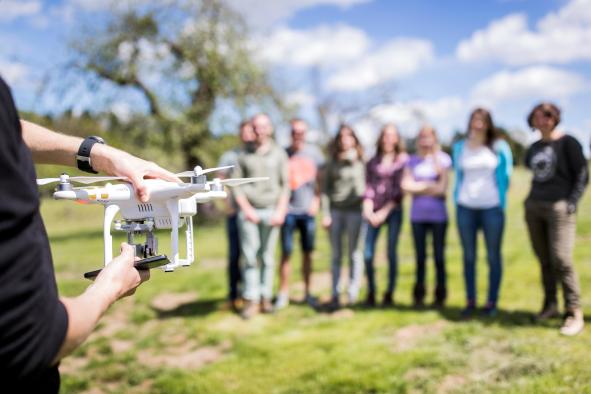
From the very first year, alongside basic training in scientific subjects, you study the fundamentals of geography (cartography, territorial analysis...) and geology (mineralogy, plate tectonics...).
You delve deeper into the fields in which geography is developing (economic geography, geographic information systems, ecology...) and learn to master specific subjects such as remote sensing, climatology, the geography of habitat and population, economics and geopolitics.
Throughout your training, you develop communication skills and the use of IT tools, and acquire a good understanding of scientific English.
Training rooted in sustainable development
The University of Namur's training in geographical sciences is part of a logic of transition towards sustainable and resilient spaces.
Learn how to respond to the social and environmental challenges facing our society (climate change, international migration, management of natural spaces and habitats, energy transition...) to acquire a scientific approach that looks to the future and to resolving societal issues!
You're off to a good start
- you have a keen sense of observation;
- you have a facility for diagramming to reproduce in a simplified way what you observe;
- you feel at ease in science without necessarily having followed a strong program in humanity;
- you have a sensitivity for nature and easy social contact;
- you have a critical and synthesizing mind.
Teaching methods
Courses, exercise sessions, practical laboratory work, field days and internships... everything is done to ensure excellent mastery of concepts and the development of practical skills. The geographical approach at the heart of the teaching project lies in the development of a capacity for systemic and multidisciplinary apprehension of geographical issues.
Organized in small groups, practical work helps you to assimilate the subjects in an adapted, high-quality framework. A project analyzing a spatial issue to be presented with your group, like a design office, enables you to acquire communication skills that will be very useful for your future profession as a geographer.
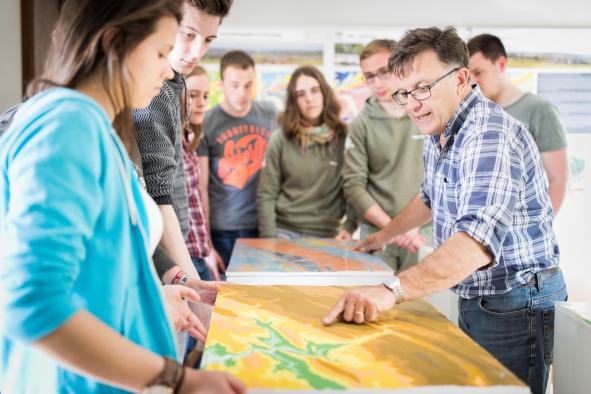
20 days in the field!Right from the start of the course, you'll take part in field days that illustrate the theoretical lessons, put you in real-life situations where you'll be applying your discipline, and familiarize you with the geographer's professional tools (GPS, drone...).
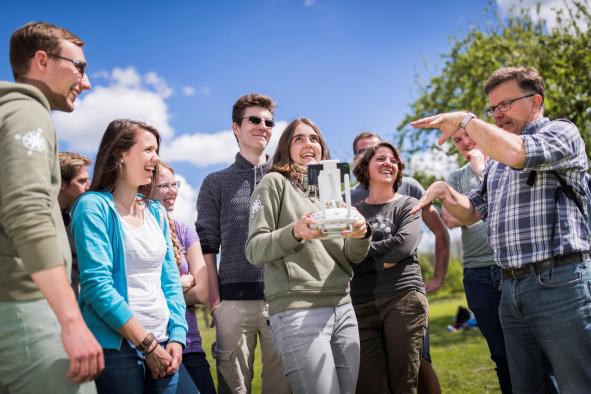
From Year 2 onwards, some of your courses are common to Blocks 2 and 3 to increase interaction and sharing of experience between students.
During the bachelor's degree, you can choose to take part in an associative project pursuing societal objectives (social justice, migration, environment...) or in the project of a company inserted in the social and solidarity economy and value your civic commitment in the form of training credits.
The completion of your end-of-cycle work prepares you for the final dissertation: you construct a research question identified according to your interests, for which you present an in-depth analysis of the scientific literature and develop a scientific methodology.
Two five-day stays abroad are included in the curriculum, one in the French Alps and the other in the Netherlands (Amsterdam, Rotterdam...). They enable you to exercise your spatial analysis skills and gain a broad understanding of regional planning issues in different environments.
Finally, you have the opportunity to compete for two prizes: the "Prix Ferraris", which rewards the best end-of-cycle work in geographical sciences at UNamur, and the "Prix de l'engagement" if, during your geography course at UNamur, you distinguish yourself from the students in your class through your involvement and commitment as a student and citizen.
International experience
Would you like to combine your studies with a unique cultural experience and/or language immersion?
This is possible thanks to the Erasmus program offered in the 3rd bachelor's block. You can carry out this study stay in Flanders, in Europe or outside Europe. Many destinations await you.
Success aids
Succeeding in a year of study at university involves many challenges.
To help you meet them, we support you in developing your disciplinary, methodological and human skills... with the support of numerous professionals.
Preparatory courses, individualized help... Discover the schemes set up for your training.
After the baccalauréat: the master's degree
A few months before the end of your bachelor's degree, a meeting with the heads of various master's programs will help you to decide what to do next.
Thanks to its diversity and the quality of its teaching methods, the bachelor's degree in geographical sciences at the University of Namur opens the doors to all masters in geographical sciences in the Wallonia-Brussels Federation and beyond (France, Luxembourg, Flanders, the Netherlands, Canada...) and enables you to specialize in specific themes: geomatics, environmental sciences and management, glaciology, demography, climatology, urban planning, geopolitics...
-
<unknown>
Code Name Staff Th.+Ex. Credits/Block 1 2 3 SCHIB111_P35309 General chemistry Wouters Johan 40h th. + 15h ex. 5 SPHYB167 Physics supplements Louette Pierre 25h th. + 10h ex. 3 SPHYB113 Syllabus, webcampus, Teams. Colaux Julien 25h th. + 11h ex. 3 SMATB110 Mathematical complements De Vleeschouwer Martine 15h th. + 15h ex. 3 SMATB111 Mathematics Daquin Jérôme 30h th. + 15h ex. 3 SPHYB124_P35419 General physics: Mechanics HEUSKIN Anne-Catherine 46h th. + 30h ex. 6 SBIOB114 Elements of biology adapted to darwinian evolution Messiaen Johan 15h th. 2 SCHIB112_P36776 General chemistry of solutions Dehon Jérémy 25h th. + 10h ex. 3 SBIOB221_P34611 <unknown> Kestemont Patrick 20h th. + 14h ex. 4 SBIOB205_P36526 <unknown> De Laender Frédérik 24h th. + 22.5h ex. 4 SBIOB328 Multivariate statistics and geostatistics Lima Mendez Gipsi 22.5h th. + 22.5h ex. 4 SBIOB207 Functional and adaptive biology Thoré Eli 40h th. + 25h ex. 5 -
<unknown>
Code Name Staff Th.+Ex. Credits/Block 1 2 3 SGOLB111 Geological fieldwork Collinet Max 21h ex. 2 SGOLB131 General geology 1 Collinet Max 30h th. + 7h ex. 4 SGOLB132 General geology 2 Collinet Max 15h th. + 26h ex. 3 SGOLB303 Environment and geology Engels Patrick Poulain Amael 20h th. + 30h ex. 4 SGOLB202 Physical geography and geomorphology Collinet Max Graveleau Fabien 30h th. + 23h ex. 5 -
<unknown>
-
<unknown>
Code Name Staff Th.+Ex. Credits/Block 1 2 3 EINCB218_P35190 <unknown> Barnabé Fanny Burnay Nathalie 30h th. + 15h ex. 5 ECGEB375_P34658 Relations économiques internationales De Crombrugghe De Picquendaele Alain 30h th. 3 LHISB219 Introduction to political economy Hungerbuhler Mathias 45h th. + 15h ex. 5 -
<unknown>
Code Name Staff Th.+Ex. Credits/Block 1 2 3 SBIOB120 Data management in life sciences, basic principles De Laender Frédérik 8h th. + 12h ex. 2 SBIOB220 Advanced data management in life sciences Lima Mendez Gipsi 12h th. + 15h ex. 2 -
<unknown>
Code Name Staff Th.+Ex. Credits/Block 1 2 3 SSPSB101 Philosophical questions Sartenaer Olivier Modera Astrid 22.5h th. + 7.5h ex. 2 Translated with DeepL.com (free version)SSPSB102 Religious Studies: Anthropology, Metaphysics and Science Leyens Stéphane Cazalis Roland 30h th. 2 -
<unknown>
Code Name Staff Th.+Ex. Credits/Block 1 2 3 SSPSB204 Logic and argumentation Sartenaer Olivier Sartenaer Olivier 22.5h th. 2 SSPSB202 History of science Sartenaer Olivier 22.5h th. 2 SSPSB203 Psychology Ravez Laurent 22.5h th. 2 SSPSB307 Formal logic Sartenaer Olivier 15h th. 2 SSPSB308 Philosophy of science Sartenaer Olivier 15h th. 2 SSPSB309 Ethical Leyens Stéphane LAURENT Nathanaël 15h th. 2
-
-
<unknown>
Code Name Staff Th.+Ex. Credits/Block 1 2 3 SELVB103 Introduction to Scientific English (level B1 and above) Tréfois Cindy 30h th. 3 SELVB303 English : Debating Science (level B2 minimum) Tréfois Cindy 30h th. 3 SELVB203 English : Communicating Sciences Effectively (level B1 and above) Tréfois Cindy 30h th. 3 -
<unknown>
Code Name Staff Th.+Ex. Credits/Block 1 2 3 SBIOB003 Pluridisciplinary scientific field trip Yans Johan Silvestre Frédéric Yans Johan Silvestre Frédéric 48h th. + 48h ex. 3 3
-
<unknown>
Code Name Staff Credits Hours/Quarter 1 2 SCHIB111_P35309 General chemistry Wouters Johan 5 40h th. + 15h ex. SPHYB167 Physics supplements Louette Pierre 3 25h th. + 10h ex. SPHYB113 Syllabus, webcampus, Teams. Colaux Julien 3 25h th. + 11h ex. SMATB110 Mathematical complements De Vleeschouwer Martine 3 15h th. + 15h ex. SMATB111 Mathematics Daquin Jérôme 3 30h th. + 15h ex. SPHYB124_P35419 General physics: Mechanics HEUSKIN Anne-Catherine 6 46h th. + 30h ex. SBIOB114 Elements of biology adapted to darwinian evolution Messiaen Johan 2 15h th. SCHIB112_P36776 General chemistry of solutions Dehon Jérémy 3 25h th. + 10h ex. -
<unknown>
Code Name Staff Credits Hours/Quarter 1 2 SGOLB111 Geological fieldwork Collinet Max 2 21h ex. SGOLB131 General geology 1 Collinet Max 4 30h th. + 7h ex. SGOLB132 General geology 2 Collinet Max 3 15h th. + 26h ex. -
<unknown>
Code Name Staff Credits Hours/Quarter 1 2 SGOGB102 Cartographic representations Linard Catherine Linard Catherine 4 30h th. + 20h ex. SGOGB101 Fundamentals of Geography - Territorial Analysis Dendoncker Nicolas 3 15h th. + 20h ex. SGOGB110 Fundamentals of Geography - Land in Geography Dendoncker Nicolas 2 14h ex. 7h ex. SGOLB106 Geography and Geology of Belgium Yans Johan Dendoncker Nicolas 4 30h th. + 14h ex. FINT0043 Global change and the Anthropocene Yans Johan Dendoncker Nicolas Houssiau Laurent Linard Catherine Henry Sabine Poulain Amael Yans Johan 3 24h th. -
<unknown>
Code Name Staff Credits Hours/Quarter 1 2 SSPSB101 Philosophical questions Sartenaer Olivier Modera Astrid 2 22.5h th. + 7.5h ex. Translated with DeepL.com (free version)SSPSB102 Religious Studies: Anthropology, Metaphysics and Science Leyens Stéphane Cazalis Roland 2 30h th. -
<unknown>
Code Name Staff Credits Hours/Quarter 1 2 SELVB103 Introduction to Scientific English (level B1 and above) Tréfois Cindy 3 15h th. 15h th.
-
<unknown>
Code Name Staff Credits Hours/Quarter 1 2 SBIOB221_P34611 <unknown> Kestemont Patrick 4 20h th. + 14h ex. SBIOB205_P36526 <unknown> De Laender Frédérik 4 24h th. + 22.5h ex. SBIOB207 Functional and adaptive biology Thoré Eli 5 40h th. + 25h ex. -
<unknown>
Code Name Staff Credits Hours/Quarter 1 2 SGOLB202 Physical geography and geomorphology Collinet Max Graveleau Fabien 5 30h th. + 23h ex. -
<unknown>
Code Name Staff Credits Hours/Quarter 1 2 SGOGB201 Introduction to Geographic Information Systems Linard Catherine DUJARDIN Sébastien 4 15h th. + 20h ex. SGOGB206 Multiple perspectives on geography: epistemological foundations Dendoncker Nicolas 2 7.5h th. + 15h ex. Soft skillsSGOGB309 Geography of the population Henry Sabine 4 30h th. + 23h ex. Translated with DeepL.com (free version)Soft skillsSGOGB305 Population and environment in the South Henry Sabine 4 30h th. Soft skillsSGOGB207 Environmental migration Henry Sabine 2 15h th. SGOGB310 Terrains en Géographie (III) Dendoncker Nicolas Dendoncker Nicolas 3 30h th. + 30h ex. SGOGB220 Geography: French Alps Dendoncker Nicolas 3 30h th. + 30h ex. Translated with DeepL.com (free version)Soft skillsSGOGB204 Application of GIS: group project Linard Catherine 5 30h ex. 25h ex. SGOGB205 History of geography Linard Catherine 3 15h th. + 15h ex. Soft skillsSGOGB203 Economic geography Henry Sabine DUJARDIN Sébastien 4 30h th. + 28h ex. -
<unknown>
Code Name Staff Credits Hours/Quarter 1 2 EINCB218_P35190 <unknown> Barnabé Fanny Burnay Nathalie 5 15h th. + 7h ex. 15h th. + 8h ex. LHISB219 Introduction to political economy Hungerbuhler Mathias 5 30h th. + 15h ex. 15h th. -
<unknown>
Code Name Staff Credits Hours/Quarter 1 2 SBIOB120 Data management in life sciences, basic principles De Laender Frédérik 2 8h th. + 12h ex. SBIOB220 Advanced data management in life sciences Lima Mendez Gipsi 2 12h th. + 15h ex. -
<unknown>
-
<unknown>
Code Name Staff Credits Hours/Quarter 1 2 SSPSB204 Logic and argumentation Sartenaer Olivier Sartenaer Olivier 2 22.5h th. SSPSB202 History of science Sartenaer Olivier 2 22.5h th. SSPSB203 Psychology Ravez Laurent 2 22.5h th.
-
-
<unknown>
Code Name Staff Credits Hours/Quarter 1 2 SELVB203 English : Communicating Sciences Effectively (level B1 and above) Tréfois Cindy 3 15h th. 15h th. -
<unknown>
Code Name Staff Credits Hours/Quarter 1 2 SBIOB003 Pluridisciplinary scientific field trip Yans Johan Silvestre Frédéric Yans Johan Silvestre Frédéric 3 48h th. + 48h ex.
-
<unknown>
Code Name Staff Credits Hours/Quarter 1 2 SBIOB328 Multivariate statistics and geostatistics Lima Mendez Gipsi 4 22.5h th. + 22.5h ex. -
<unknown>
Code Name Staff Credits Hours/Quarter 1 2 SGOLB303 Environment and geology Engels Patrick Poulain Amael 4 20h th. + 30h ex. -
<unknown>
-
<unknown>
Code Name Staff Credits Hours/Quarter 1 2 ECGEB375_P34658 Relations économiques internationales De Crombrugghe De Picquendaele Alain 3 30h th. -
<unknown>
-
<unknown>
Code Name Staff Credits Hours/Quarter 1 2 SSPSB307 Formal logic Sartenaer Olivier 2 15h th. SSPSB308 Philosophy of science Sartenaer Olivier 2 15h th. SSPSB309 Ethical Leyens Stéphane LAURENT Nathanaël 2 15h th.
-
-
<unknown>
Code Name Staff Credits Hours/Quarter 1 2 SELVB303 English : Debating Science (level B2 minimum) Tréfois Cindy 3 15h th. 15h th. -
<unknown>
Code Name Staff Credits Hours/Quarter 1 2 SBIOB003 Pluridisciplinary scientific field trip Yans Johan Silvestre Frédéric Yans Johan Silvestre Frédéric 3 48h th. + 48h ex.
Les métiers des géographes
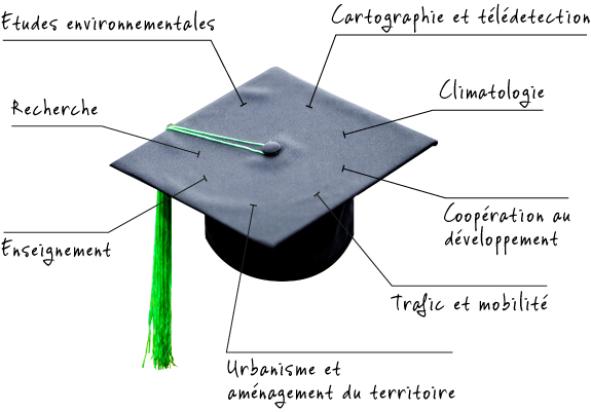
Geographers' professions
Training in geography opens the doors to an extremely wide range of professions.In this web series, discover eight fields of activity in which former geography students (most of them from) UNamur excel!
Here are some of the questions you're probably asking yourself, and which will find answers in these various videos:
- How to anticipate floods?
- How to set up a new solar panel field?
- Why is it useful to analyze the landscape?
- Why do we learn geo in high school?
- ...
Working in a nature park
Analyzing a landscape, why is it useful?
Annick Burnotte, in charge of regional planning and landscape, takes us through her role within a Nature Park.
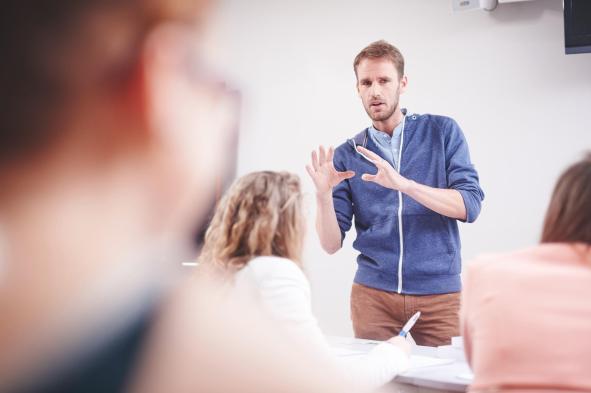
Satellites at the service of society
Do you have any idea how to anticipate flood risks?
Nathalie Stephenne, a geomatics specialist, puts her passion at the service of society. She tells us how satellites and cartography enable us today to anticipate and manage natural hazards.

When teaching becomes a passion
Back in the day, why do we teach geography in secondary schools?
Jérémie Bihin discovers his passion for teaching through his experiences. Now a secondary school teacher, he talks about the importance of teaching this discipline to today's young people.

Working with developing countries to combat epidemics
And in Africa, are we fighting an epidemic like covid-19?
Yann Forget is a "data scientist".He reveals how spatial analysis of health data plays a role in managing epidemics on the African continent.

Cartography at the service of cyclists
Is cycling a geographer's business?
Marc Lejeune creates guides and itineraries for cyclo-travelers. With an entrepreneurial spirit, he travels France on two wheels to expertly craft maps tailored for bike lovers.

Building a more sustainable energy world
How to set up a new solar panel field?
Renewable energies are a solution for the future. Maxime Vandeputte is project manager of a team that carries out impact studies notably on the siting of wind and solar power farms in Wallonia.

"Public transit has a bright future".
Do you know how TEC bus networks are designed?
Marie Vidotto is a mobility manager. Today she tells us how, in the public sector, TEC bus network routes are thought out and developed to best meet user demand.

Migration is also a matter for geographers!
Fedasil, does that ring a bell?
Perrine Raquez works at Fedasil. While migration is a topic that polarizes many, she works on a day-to-day basis to ensure that the arrival and settlement of migrants from conflict zones goes as smoothly as possible.
